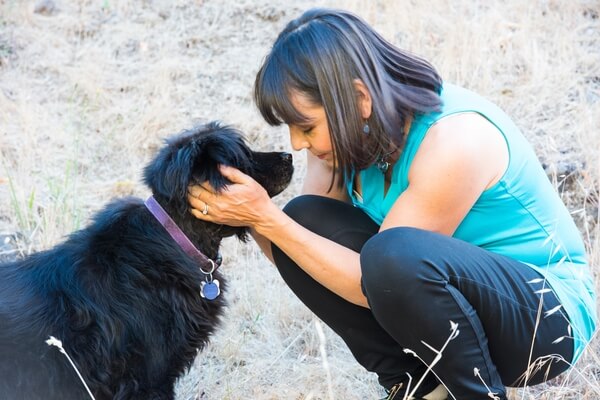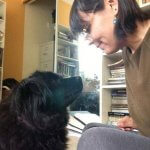I woke up Saturday morning facing that situation that all animal lovers dread. Dakota, my 15-year-old black chow mix, had suddenly became lethargic and disoriented.

Once in the car, fear joined me on the passenger side and accompanied me all the way to the animal emergency hospital. A quick exam revealed a 105-degree fever, but extensive lab tests were needed to determine whether the cause was an infection, inflammation, or something worse. In an elderly dog, just as in an older human, any of these scenarios would be significant.
For the Next Two Days …

The Magic in Connection
I’m certain that Dakota would rather have been at home, instead of being poked with needles, prodded with thermometers, and hooked up to IVs. Nonetheless, she seemed to take things in stride. Not me. I felt the reopening of those old wounds of the loss of family members, friends, and my animals who had passed. The tears began to flow as I contemplated the notion that these might be my last hours with my lovely dog.
But Dakota’s serenity reminded me what I had learned the last time that I was here saying goodbye to another of my beloved dogs. During Roxy’s passing, I had learned the best way to move through the stages of death is to appreciate life’s moments. The small, seemingly inconsequential exchanges that we have with our animal friends—the laughter we share, the cuddles, the tenderness—these are the magic moments that are important to recognize, relish, and remember.
The Top Five Regrets of the Dying
In her book by the same title, Bronnie Ware, an Australian nurse, found that the people she cared for in the last days of their lives had all wished the same things:
- I wish I had had the courage to be true to myself.
- I wish I hadn’t worked so hard.
- I wish I had had the courage to express my feelings.
- I wish I had stayed in touch with my friends.
- I wish I had let myself be happier.
Our animal friends don’t have these regrets, and they can help us learn to avoid them, too, because they exemplify the important things in life:
- Animals are authentic and true to themselves. Cats don’t think they’re lions, and a dachshunds don’t dream of being poodles.
- Work isn’t the “be all and end all” for our animal companions. Playtime, on the other hand, just might be.
- They readily express their love, affection, and joy.
- They thrive on their friendships with their human guardians.
- They allow themselves to be happy even when they have endured unimaginable trauma.
I suddenly realized that if I spent these moments mourning Dakota now while she was still with me, I would be wasting our precious time together—a time we would never get back. Immediately, I let go of the memories of the past and the fears of the future and began to focus on the only place that truly exists for all of us and especially for our animal friends: the present.
We never discovered the cause of her illness, but Dakota’s fever broke, and she’s back home with us and back to her silly ways. For this, I’m very grateful. But I’m even more grateful to have reconnected with her on a deeper level and to have been reminded that, although a dog’s life may seem simple, the wisdom in that simplicity is precious.
Stay Pawsitive,
Carlyn
***
Carlyn Montes De Oca




